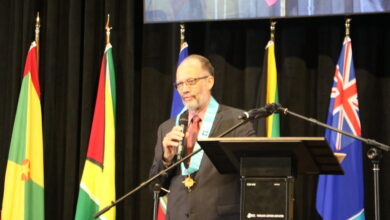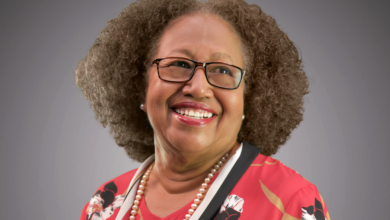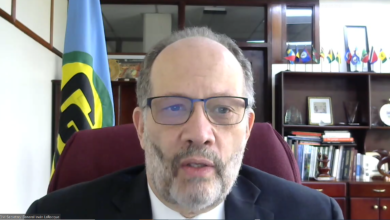(CARICOM Secretariat, Turkeyen, Greater Georgetown, Guyana) Excellency, it is my great pleasure and honour to welcome you to Guyana and to the Caribbean Community (CARICOM) Secretariat, on this historic occasion of the presentation of your credentials as the first Plenipotentiary Representative of the Republic of Singapore to the Caribbean Community. This ceremony today heralds a welcome development in deepening CARICOM-Singapore relations. Your accreditation as Plenipotentiary Representative of Singapore to CARICOM is an act that enhances and strengthens the relationship between Singapore and the Region.
Ambassador, although our countries cannot boast of long historical ties, nor claim geographic proximity, the similarities between CARCIOM countries and Singapore as small-island vulnerable states are many. The mutual interests and the benefits which can be realised from closer relations between our countries, therefore justify the taking of this important step in cementing the bonds of friendship that have been forged between CARICOM and Singapore.
Our budding relationship with Singapore has primarily been in the form of cooperation and collaboration in international organisations in the context of the shared values and principles that we embrace in fora such as the Commonwealth and the Alliance of Small Island States (AOSIS). Further your country has taken a bold step at the United Nations in being the principal architect of the recently formed Global Governance Group (3G) in which three of our Member States are active participants. This group has been formed primarily to exchange views on issues concerning global governance in the aftermath of the emergence of the G20 process and to explore ways in which non-G20 members can better engage and feed their views into the G20 process.
CARICOM welcomes these engagements among Small States, as these countries, by their very nature, share specific concerns and common interests such as environmental and economic vulnerabilities. We also applaud Singapore’s support of such platforms that allow Small States to discuss and foster common positions on issues of mutual concern, thereby giving these countries a bigger voice in the UN and other international fora.
Excellency, the Community has taken note of Singapore’s development and advancements which have made it a success story among Small States. The idea that a small-island city state of five million people could survive and prosper in today’s world might have seemed improbable. While the odds might have been against Singapore’s success, it is now a globalized economic powerhouse with ample financial resources; a pool of talented and skillful workers and a cohesive society. Singapore's success story is an example of what can be achieved by Small States.
During our Twenty-Third Inter-Sessional Meeting of the Conference of Heads of Government of the Caribbean Community, held just last week in Suriname, our Leaders discussed many of the issues that Small States continue to champion. I will mention only (2) two of them here – the global concern of climate change and representation for Small States in fora which influence and develop global financial and economic policies.
With respect to climate change, CARICOM Member States continue to argue that the Region’s contribution to the effects of the phenomenon is utterly miniscule and immeasurable, yet it is made to bear a disproportionate financial burden for mitigation and adaptation measures. The Liliendaal Declaration on Climate Change, issued by CARICOM Heads of Government in July 2009, will guide CARICOM’s participation in upcoming fora regarding climate change and sustainable development issues. These include the United Nations Conference on Sustainable Development (UNCSD) to be convened in June 2012 in Brazil, and COP 18 to be held in Qatar later this year. We are aware of your keen interest in these issues, as exemplified by your much admired Sustainable Development Blueprint and look forward to your support for our efforts in this area.
Turning to the issue of Small States’ voices in international economic fora such as the G20, it has been proposed that the Community should seek to be represented or gain access to the meetings of the G20, or at least have their concerns addressed during the deliberations. This position is in congruence with the Global Governance Group’s position for strengthening the framework for G20 engagement of non-members, as outlined in the document submitted by the 3G to the UN Secretary General in 2010.
Excellency, I recall our brief yet engaging Meeting in September 2010 when you visited the Secretariat, then in your capacity as Special Representative of the Minister of Foreign Affairs of Singapore, and there was an exchange of views on the Caribbean region. Discussions also focused on possible areas of training for Caribbean countries under the Singapore Cooperation Programme. I understand that CARICOM Member States have participated in various courses conducted under this Programme. The Community recognises that our human resources are our most valuable assets and are therefore grateful for Singapore’s assistance in this regard.
In taking note of your strong economic and technical co-operation ties with Latin America, I look forward to the Caribbean Community and Singapore exploring ways to strengthening our relations in those areas.
The CARICOM-Singapore relationship is one of great potential and promise. Therefore, as you assume the role as your country’s Plenipotentiary Representative to the Caribbean Community, be assured of the commitment of the Secretariat and the Community as a whole, to enhance and deepen the relationship.
Your Excellency, I extend my best wishes for a successful and rewarding tour of duty, and graciously accept your credentials as your country’s Plenipotentiary Representative to the Caribbean Community. Thank you.




